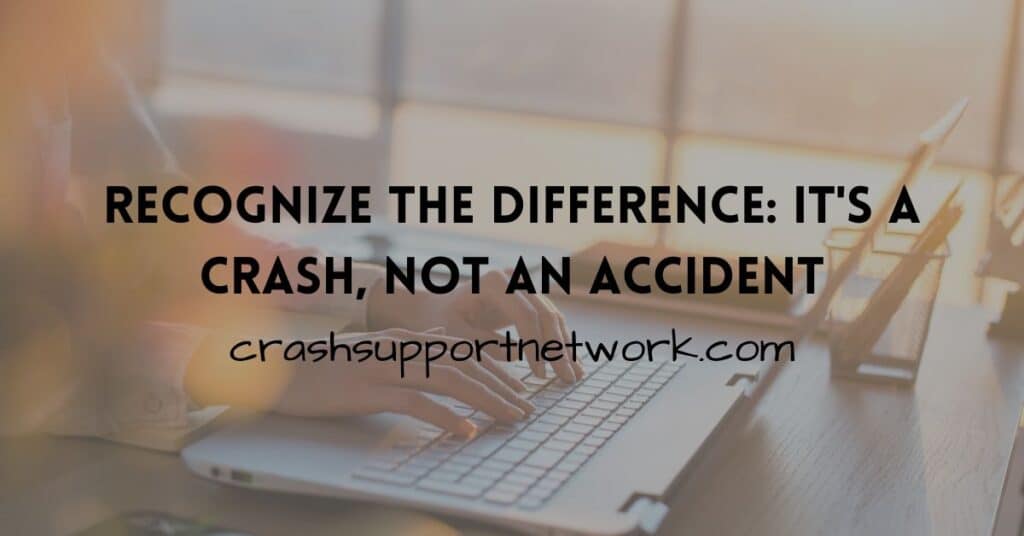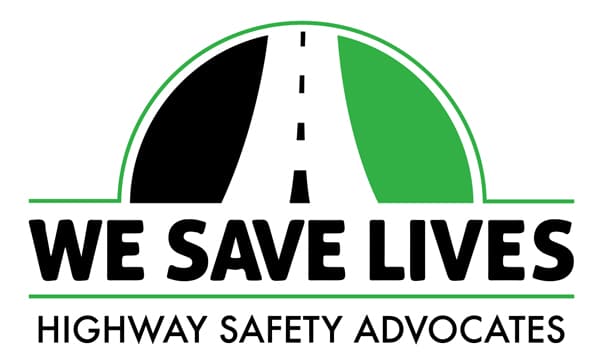
Words shape our understanding and perception of events. For a crash survivor that is recovering, the choice between “accident” and “crash” can be significant. “Accident” tends to imply that no one is at fault — and when it’s used in the context of a traffic crash, it also can give the impression that what occurred was not that serious even if the crash survivor suffered serious or life-changing injuries.
A couple of months ago, I watched a great interview with a personal injury lawyer describing the importance of what you should do when you are injured in a collision. I was taken back that both the journalist and the lawyer were referring to motor vehicle crashes as “motor vehicle accidents”. As a matter of fact, I counted the number of times that the words “motor vehicle accident” were used and I lost count after 35. Over 35 times in a 9-minute interview!
Most recently, I also noticed a medical professional writing some amazing posts advocating for crash survivors whose injuries are continuously downplayed by insurance companies and that change is needed. Sadly, they were also using “car accidents” and not crashes or collisions. Apparently, this is a tough habit to break for some and I find myself asking why? Is it because insurance companies are still calling it a car accident so they can minimize the motor vehicle crash right away in order to remove fault from the driver?
The Implications of Using “Accident”
The term “accident” is commonly used to describe events involving vehicles. However, its implications can be problematic and confusing to someone that is recovering from a motor vehicle crash.
- Using the word “accident” suggests that an event was purely unintentional, a mere mishap without any underlying cause or fault.
- Stating it was an accident can downplay the seriousness of the event, making it seem like a minor incident rather than a significant occurrence with potentially life-changing consequences.
- Using the word “accident” may inadvertently reduce the perceived responsibility of involved parties, suggesting that no one is to blame or the person that caused the serious or life-changing injuries to a crash survivor just made a mistake.
Why “Crash” is the Better Choice
Switching to the term “crash” offers several advantages:
- “Crash” conveys the force and impact of the event, highlighting its potential for serious injuries or damage.
- Unlike “accident,” “crash” does not imply a lack of intention or fault. It simply describes what happened, allowing for a more unbiased discussion of the event.
- By using “crash,” we draw attention to the outcomes and the need for accountability, which is crucial where liability and compensation are at stake.
Why Words Matter to a Crash Survivor:
- Using “crash” acknowledges the survivor’s experience as a significant event with potential preventable causes. It validates our feelings and challenges by emphasizing that what happened was not just random or inevitable.
- The word “crash” suggests a clearer cause-and-effect relationship, which can be important in understanding who or what was responsible. It can help survivors and their support networks navigate legal, insurance, and recovery processes more effectively.
- Crash survivors find the word “crash” more respectful and less minimizing of their experience compared to “accident,” which can imply a lack of intent or responsibility. It aligns with trauma-sensitive language by acknowledging the severity and impact of the event.
- Using appropriate terminology like “crash” in medical and therapeutic settings can foster a more supportive environment for us. It allows healthcare professionals to better understand our needs and tailor treatment and support accordingly.
Police officers and first responders understand the critical importance of using precise and respectful language when dealing with car crashes. First responders often interact directly with crash survivors and their families. Choosing empathetic and respectful language can help build trust, show support, and reduce additional emotional distress during a difficult time. They also play a crucial role in shaping public perception and understanding of road safety issues. Using language that accurately reflects the seriousness of crashes can promote awareness and community involvement in prevention efforts. On a positive note, police officers, first responders and most journalists have dropped “accident” and replaced it with collision or crash.
Drivers Have a Choice
Choosing our words carefully is not just about semantics; it’s about shaping perceptions and ensuring justice. By using “crash” instead of “accident,” we can accurately convey the gravity of vehicular incidents that are life-changing or even fatal. What it comes down to is this: People are injured. Families lose loved ones. And expenses pile up as crash survivors struggle to recover. In essence, words matter deeply to crash survivors because they shape how their experience is understood, supported, and addressed by others, and how they perceive their own recovery journey.
Is it an accident when a driver runs a stop sign or a red light and causes serious injuries to an innocent victim? Is it an accident when a driver speeds recklessly and changes lives forever? Is it an accident when someone drives impaired or distracted and causes life changing consequences? Drivers have a choice.
Organizations such as the non-profit “We Save Lives” run a campaign in order to discontinue the use of the word accident when referring to car crashes. RoadPeace has also put a call out on all Organizations who use the wrong language, using the tagline #crashnotaccident.
Please Recognize the Difference: It’s a Crash, Not an Accident.
S. Dawne McKay is a survivor of a horrific crash that changed her life forever. Dawne shares her personal journey as a Crash Survivor Blogger and also collaborates with crash survivors as Guest Bloggers allowing them an opportunity to share their stories. Dawne is also the author of the book, “Talk Crash to Me – What to Expect After Surviving a Collision and How to Manage Your Recovery” which is available for purchase on Amazon.
The Crash Support Network is a unique one-of-a-kind website consisting of an online support group, a crash survivor blog, a quarterly newsletter, “Sharing Our Recovery” as well as highly informative articles. Our website is based on relationship-building and puts the needs of survivors first by creating a helpful resource for victims and survivors of motor vehicle crashes





